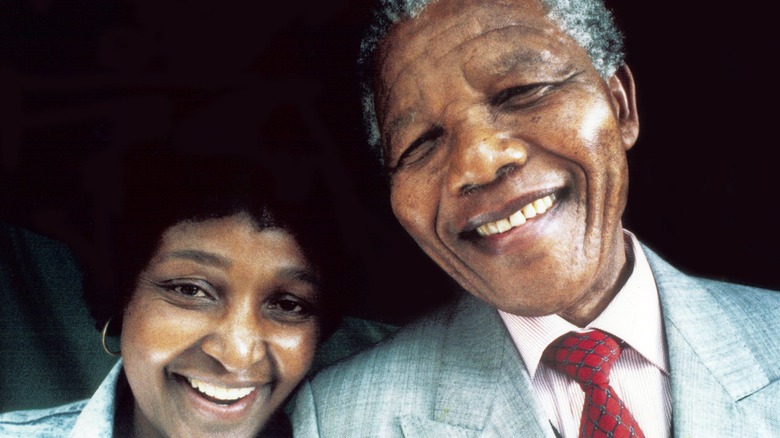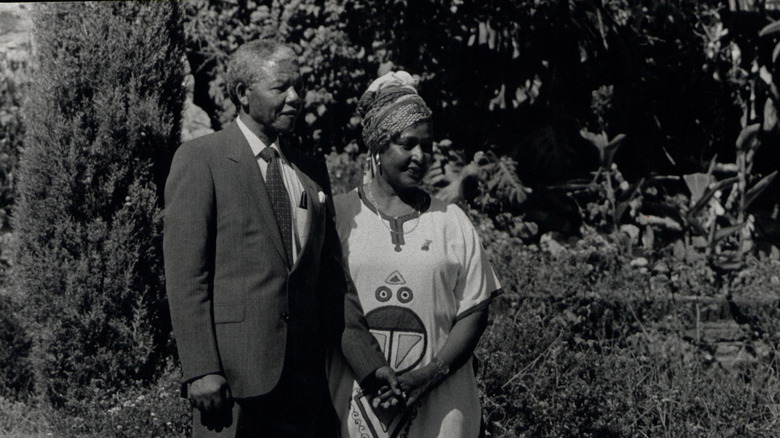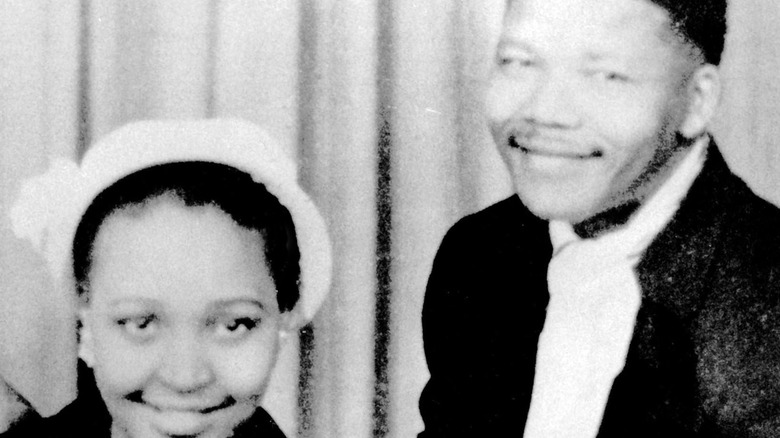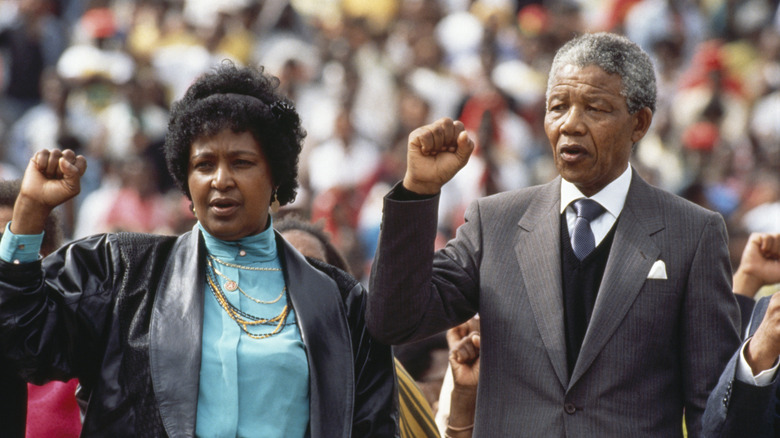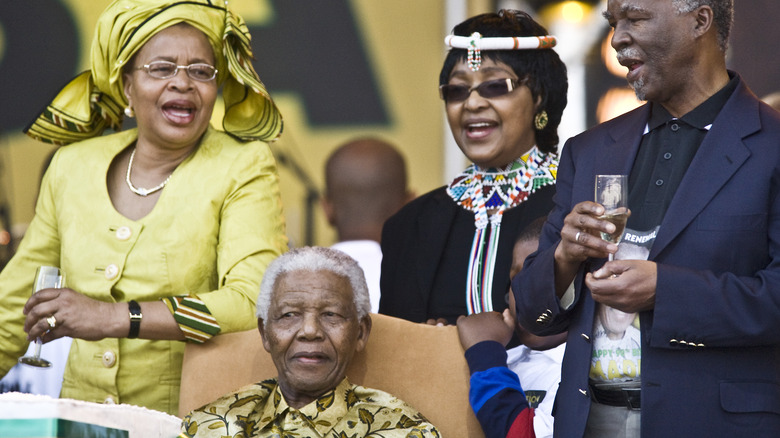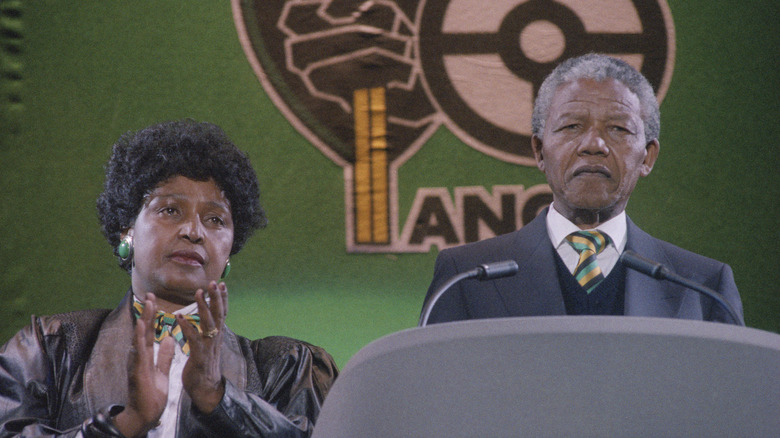Inside Nelson And Winnie Mandela's Relationship
Around the world, the marriage of Nelson and Winnie Mandela was celebrated as a display of love in adverse conditions. Separated by the political circumstances of the time, the two South African freedom fighters were only married for four years before Nelson Mandela was arrested and eventually sent to prison for almost three decades (via The Guardian).
While Nelson wallowed in a prison cell, away from his wife and their two daughters, Winnie Mandela became the new face of the Black South African struggle against the racist apartheid system. Like her husband, Winnie would be subjected to arrest, torture, and harassment campaigns by the white-minority-controlled state. As the years went on and the apartheid system became more untenable, Nelson Mandela was released from prison, and waiting for him outside was Winnie.
Nelson's release and his election as the first President of South Africa after apartheid seemed like the ending to years of struggles. The image of the Mandelas raising their hands together shortly after his release was powerful. Still, the marriage would not survive and in 1992, the couple separated in a whirlwind of accusations and political motives.
Outside of the years in prison, the couple only lived together and husband and wife for six years in total, from 1958 to 1962 before Nelson's imprisonment, and 1990 to 1992 after his release. Still, both individuals' names are forever linked in South African history and are symbols of South Africa's independence to self-governance. Despite their divorce, the Mandelas remained close for the remainder of their days.
They met when Nelson was Already Married
The beginning of Nelson and Winnie's love story was also the end of a love story for Nelson Mandela and his first wife, Evelyn Mase. According to The New York Times, in 1944, Mandela married Evelyn, who was the cousin of famed anti-apartheid leader Walter Sisulu. During their marriage, the couple had four children (one died shortly after birth). However, by his admission, Mandela was an absent father and neglectful husband, focusing more on his continued activism in South Africa with the African National Congress or the ANC. He had this to say in his autobiography, "Long Walk to Freedom" (via The New York Times) about his first marriage.
"I could not give up my life in the struggle, and she could not live with my devotion to something other than herself and her family. I never lost my admiration for her, but in the end, we could not make our marriage work.”
The couple separated in 1955 and officially divorced in 1957 (per Biography). Soon after, the divorced Nelson met his second wife, Winnie. As told by Biography, Winnie was born Nomzamo Winifred Madikizela on September 26, 1936. She became the first Black medical social worker at Baragwanath Hospital in Johannesburg, South Africa. One day, the 22-year-old Winnie was standing at a bus stop and was spotted by Nelson, who had become the leader of the ANC by this time (via The Guardian). The two began a courtship and married in 1958.
Their marriage before Nelson's Arrest
According to Biography, Winnie's father was wary about her daughter marrying Nelson because of his age (Nelson was 18 years her senior) and because of his involvement in the ANC. Still, the 22-year-old, now Winnie Madikizela-Mandela moved with her husband to Soweto, South Africa, for his work. While in love, her father's predictions were correct, as Nelson's increased political work usually left Winnie home alone or barely seeing her husband. She had this to say about their relationship before his 1964 prison sentence (via The Guardian).
"One moment, I was watching him. Then he would dash off to meetings, with just time to drop me off at the hostel. Even at that stage, life with him was a life without him."
Still, the couple would have two daughters together, Zenani and Zindziswa, and together, they would continue their work in the ANC to put an end to South Africa's apartheid government. In 1961, Nelson organized a three-day national workers' strike, as well as organized a more militant offshoot of the ANC, the Umkhonto we Sizwe, which used guerilla tactics and sabotage against the South African government (per Biography). His leadership in the protest led to his arrest in 1962 and he was handed down a five-year prison sentence. The following year, he and 10 other members of the ANC were bought on trial again. The infamous Rivonia Trial ended with Mandela being handed a life sentence for different political offenses.
Winnie Mandela's Life During Nelson's Imprisonment
From November 1962 to February 1990, Nelson Mandela was imprisoned because of his anti-apartheid activities with the ANC. However, his imprisonment did not stop Winnie Mandela from taking the mantle and she led the new charge against the South African government. In order to do that, she was forced to send her daughters to Swaziland boarding school where they could have a peaceful childhood (per Biography).
Like her husband, her activism made her a target for the South African government and she was regularly detained by authorities. A 1969 detainment under the Terrorism Act led to 17 months of solitary confinement where she was tortured by guards, according to South African History Online.
In 1977, Mandela was forced into an eight-year exile to Brandfort that ended after her home was bombed. She continued to work on anti-apartheid causes and became a symbol of freedom. That being said, some people believed the banishment and years of subjugation led Winnie to become more militant in her activism for South Africa. Her private bodyguards, the Mandela United Football Club, were known for their ruthlessness, and in 1989, members of the club abducted and killed a 14-year-old boy named Stompie Moeketsi.
Winnie herself was convicted for kidnapping and accessory to commit assault. Her six-year prison sentence was turned into a fine. While the event was a black mark on her activism, she still today is seen as many as the "Mother of the Nation."
Nelson Mandela's Release from Prison and the Couple's Divorce
The release of Nelson Mandela from prison in 1990 marked the symbolic death of the apartheid government of South Africa. On February 11, 1990, the President of South Africa, F.W. de Klerk, pressured by the international community, announced that Mandela would be released, as well as suspended executions and lifted the ban on all political parties, including the ANC (via Biography).
Despite his release, Nelson Mandela continued to push the international community to pressure South Africa to push for the first multiracial election. Despite the continued violence and Black militants attacking Mandela for negotiating with Klerk, the pair were awarded the Nobel Peace Prize in 1993, and the next year, Mandela was elected President of the country that once imprisoned him.
During this time of political upheaval, Nelson and Winnie's marriage reached its end. The image in 1990 of the couple walking together free was marred when two years later, the pair separated. According to The Guardian, news that Winnie had an affair with a lawyer named Dali Mpofu was a catalyst for the divorce. His friend, Claude Colart, said in an interview with Sky News in 2018 that Nelson regretted that his activism made having a normal family life nearly impossible. The pair officially divorced in 1996, a year after Nelson and others in his government pushed Winnie Mandela from her position as the deputy minister of arts, culture, science, and technology due to her militant rhetoric (per Biography).
Winnie remained close and criticized Nelson
Many divorced couples tend to stay as far away from each other as they are able to. However, when a divorced couple is the face of a nation and a symbol of its long struggle for freedom, this can be difficult. According to The Guardian, while the couple separated in the bedroom, as well as in many political ways — with Nelson being a reformist in the post-apartheid South Africa and Winnie maintaining her revolutionary beliefs — the pair found a solid middle ground to lead the nation.
According to Biography, Winnie made her way back to politics when she was elected to Parliament in 1999. However, she was once again forced out of her position when she resigned in 2003 after being convicted of economic fraud. This conviction would be later overturned. Outside of Parliament, the radical Winnie criticized her ex-husband and former archbishop and Nobel Prize winner Desmond Tutu in 2010 in the Evening Standard for working so closely with former South African President F.W. de Klerk (per USA Today).
In 1998, Nelson would marry Graca Machel, the first Education Minister of Mozambique (per Biography). The couple would stay married until his death in 2013 at 95 years old. Winnie stayed at her ex-husband's side during his final moments, as she told On Demand News (via YouTube). Winnie also said that she knew her ex-husband better than anyone else. Five years later, Winnie would pass away at 81 years old. Both individuals were honored by the country.
